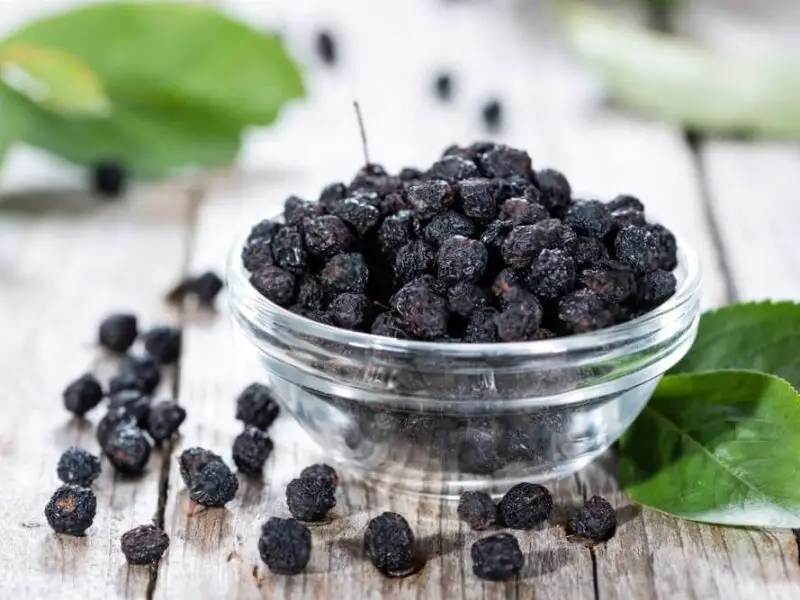Have you ever heard of aronia berries but had no idea what they taste like? These deep purple berries might look unassuming, but they pack a serious punch of flavor that’s unlike any other fruit. Imagine biting into a tart cranberry that’s been infused with hints of blueberry, cherry, and even red wine. Sounds intriguing, doesn’t it?
Aronia berries have been taking the superfood world by storm, lauded for their impressive nutritional profile. But their unique taste is what really sets them apart. Many people struggle to pinpoint the exact flavor, describing it as a delightful blend of sweet and sour that dances across your taste buds.
If you’re curious about what do aronia berries taste like and trying this one-of-a-kind berry, stick around. In this article, we’ll dive deep into the flavor profile of aronia berries, exploring their tart tanginess, fruity undertones, and the factors that contribute to their distinct taste. You’ll also discover creative ways to incorpo\\rate these little gems into your diet and reap their health benefits.
What Do Aronia Berries Taste Like?
At first bite, aronia berries greet your taste buds with an unmistakable tartness that might make you pucker up. This initial burst of astringency is often described as reminiscent of cranberries, but with a slightly more complex and nuanced flavor profile.
As you continue to savor the berry, you’ll start to detect subtle undertones of other fruits weaving their way through the tartness. Many people pick up on hints of blueberry, lending a touch of sweetness to balance out the sour notes. There’s also a distinct cherry-like quality that adds depth and richness to the overall flavor.
But aronia berries aren’t content with just tasting like a medley of other fruits. They bring their own unique character to the table, with some describing a mild yet intriguing taste reminiscent of red wine or pomegranate. This unexpected dimension adds a sophisticated twist to the berry’s flavor, making it a true standout among other fruits.
Despite their initial pucker-inducing tartness, aronia berries aren’t overwhelmingly sour. In fact, they possess a moderate level of sweetness that becomes more pronounced as the berries reach peak ripeness. This sweet-tart balance is what makes them so appealing, offering a refreshing and tangy experience without being overpowering.
The flavor intensity of aronia berries can vary depending on several factors. Unripe berries tend to be more tart and astringent, while fully ripe berries develop a slightly sweeter and more well-rounded taste. Additionally, growing conditions like soil quality and climate can influence the flavor nuances.
Comparing Aronia’s Unique Taste to Other Fruits
While aronia berries have a flavor profile that is truly one-of-a-kind, it’s often helpful to draw comparisons to more familiar fruits to better understand their taste. After all, describing a new flavor can be challenging, and analogies can provide valuable context.
Perhaps the most common comparison drawn is between aronia berries and cranberries. Both fruits share a distinct tartness that puckers the mouth and awakens the taste buds. However, aronia berries have a more complex and nuanced flavor that goes beyond the one-note sourness of cranberries.
Many also liken the taste of aronia berries to that of blackberries or raspberries, but with a tangy twist. The dark, rich flavors of these berries are present, but they’re accompanied by a tartness that sets aronia berries apart. It’s as if someone took a blackberry and infused it with a burst of lemon or lime.
Another fruit that aronia berries are often compared to is pomegranate. Both share a certain astringency and a slightly bitter edge that lingers on the palate. However, aronia berries have a more pronounced tartness that cuts through the bitterness, creating a unique flavor balance.
Interestingly, some detect notes of red wine in aronia berries, particularly as they ripen and develop a deeper, more complex flavor profile. This unexpected comparison might seem odd at first, but it speaks to the sophisticated and multi-layered taste that sets these berries apart.
While comparisons can be helpful, it’s important to remember that aronia berries have a flavor that is truly their own. They might share certain characteristics with other fruits, but the combination of tastes – tart, sweet, fruity, and slightly astringent – creates a flavor experience that is distinctly aronia.
Factors That Influence Aronia’s Distinctive Flavor
While aronia berries have a signature taste that sets them apart, their flavor can be influenced by various factors. Understanding these variables can help you appreciate the nuances in flavor and ensure you’re enjoying these berries at their peak deliciousness.
Ripeness Level
One of the most significant factors affecting aronia berry flavor is ripeness. Unripe berries tend to be incredibly tart, almost to the point of being mouth-puckering. As they ripen, however, the tartness mellows, and a subtle sweetness emerges, creating a more balanced taste.
Aronia berries typically start off a bright red color when unripe, gradually deepening to a rich, dark purple hue as they mature. This color change is a helpful visual cue for judging ripeness – the darker the berry, the more mellow and sweet the flavor is likely to be.
It’s essential to let aronia berries fully ripen on the plant before harvesting them. Picking them too early can result in an overwhelmingly sour taste that might be off-putting to some palates. Patience is key when it comes to enjoying these berries at their flavor peak.
Growing Conditions
Like many fruits, the taste of aronia berries can be influenced by the growing conditions in which they were cultivated. Factors such as soil quality, sunlight exposure, and even the specific microclimate can all play a role in shaping the flavor profile.
For example, berries grown in nutrient-rich soil with ample sunlight tend to develop a more pronounced sweetness and deeper, more complex flavors. In contrast, those grown in less-than-ideal conditions may taste more tart and one-dimensional.
The geographical location of the aronia berry plants can also impact their taste. Berries grown in warmer climates tend to ripen faster and develop a sweeter, more lush flavor, while those from cooler regions may retain a bit more tartness and astringency.
Variety
While all aronia berries share a similar flavor foundation, different varieties can exhibit subtle nuances in taste. Some varieties may be slightly sweeter, while others lean more towards the tart side. Certain varieties may also have more pronounced notes of specific fruits, like blueberry or cherry.
Growers and producers often develop proprietary varieties that offer unique flavor profiles, catering to different taste preferences. For example, one variety might be prized for its intense tartness, while another might be favored for its well-balanced sweetness and tanginess.
Creative Ways to Enjoy Aronia Berries
With their distinctive taste and impressive nutrient profile, aronia berries are a versatile addition to any diet. From fresh to baked goods, juices to alcoholic beverages, there are countless ways to incorporate these flavorful berries into your culinary adventures.
Straight from the Bush
For those who truly want to experience the pure, unadulterated flavor of aronia berries, enjoying them fresh is the way to go. Simply rinse the berries and pop them into your mouth, allowing the tart, fruity flavors to burst across your taste buds. Keep in mind that fresh aronia berries can be quite sour, especially if they’re not fully ripe, so you might want to temper their tartness by mixing them with sweeter fruits like bananas or mangoes.
Juiced to Perfection
Aronia berry juice is a popular way to enjoy the fruit’s flavor while also reaping its impressive nutritional benefits. The deep purple hue of the juice is a visual delight, and the taste is a delightful balance of tart and sweet, with hints of berry and even a subtle richness reminiscent of red wine. Aronia berry juice can be enjoyed on its own, mixed with other fruit juices, or even incorporated into cocktails for a unique twist.
Baked Delights
The distinct flavor of aronia berries lends itself beautifully to baked goods, adding a delightful tanginess to everything from pies and cobblers to jams and jellies. The tartness of the berries pairs particularly well with sweeter ingredients like sugar or honey, creating a harmonious balance of flavors. Aronia berry jam, for example, is a delightful treat that allows the fruit’s unique taste to shine through while mellowing its pucker factor.
Smoothie Sensation
For a refreshing and nutrient-packed beverage, try incorporating aronia berries into your favorite smoothie recipes. Their tart flavor can help cut through the richness of ingredients like bananas or nut butter, while their subtle sweetness complements other fruits like strawberries or mangoes. Aronia berry smoothies are not only delicious but also a convenient way to enjoy the fruit’s antioxidant and vitamin-rich benefits.
Health Benefits of Aronia Berries
While the unique taste of aronia berries is undoubtedly a draw, these tiny fruits pack a powerful nutritional punch that makes them a true superfood. Packed with antioxidants, vitamins, and minerals, aronia berries offer a host of potential health benefits that make them a worthwhile addition to any diet.
Antioxidant Powerhouse
One of the most impressive aspects of aronia berries is their exceptionally high antioxidant content. These berries are rich in polyphenols, particularly anthocyanins, which are the compounds responsible for their deep purple hue. Antioxidants help neutralize harmful free radicals in the body, reducing oxidative stress and potentially lowering the risk of various chronic diseases, including cancer, heart disease, and neurodegenerative conditions.
Inflammation Fighter
Chronic inflammation is at the root of many health issues, from arthritis to autoimmune disorders. Fortunately, aronia berries possess potent anti-inflammatory properties, thanks to their high levels of polyphenols and vitamin C. These compounds can help reduce inflammation in the body, potentially alleviating symptoms associated with inflammatory conditions.
Digestive Health Support
The high fiber content in aronia berries can contribute to a healthy digestive system. Fiber aids in maintaining regular bowel movements and promoting a balanced gut microbiome. Additionally, the berries contain compounds that may help protect against ulcers and other gastrointestinal issues.
Immune System Booster
Aronia berries are an excellent source of vitamin C, a essential nutrient for supporting a strong immune system. Vitamin C plays a crucial role in the production of white blood cells, which are the body’s first line of defense against pathogens and infections.
Potential Cardiovascular Benefits
Early research suggests that the polyphenols found in aronia berries may have positive effects on cardiovascular health. These compounds may help lower blood pressure, improve blood lipid profiles, and reduce the risk of blood clots, potentially decreasing the likelihood of heart attacks and strokes.
While more research is needed to fully understand the extent of aronia berries’ health benefits, the current evidence is promising. By incorporating these nutrient-dense berries into your diet, you can not only enjoy their unique flavor but also potentially reap a host of health rewards.
It’s important to note that while aronia berries are generally safe for most people, those with specific health conditions or taking certain medications should consult with a healthcare professional before adding them to their diet in significant quantities.
FAQs
Do aronia berries taste sour or bitter?
Aronia berries have a predominantly tart, almost sour taste when unripe or first biting into them. However, they are not bitter. The tartness is often compared to cranberries. As they fully ripen, aronia berries develop more sweetness to balance out the tartness.
How does the taste of aronia berries compare to blackberries?
While aronia berries share some similarities in their rich, dark color to blackberries, their flavor profiles differ. Aronia berries tend to be much more tart and astringent compared to the sweeter, jammy taste of blackberries.
Do all aronia berry varieties taste the same?
No, there can be some variation in flavor between different varieties of aronia berries. Some may lean more tart, while others are slightly sweeter. Certain varieties might also have more pronounced notes of specific fruits like blueberry or cherry.
Does cooking or processing change the taste of aronia berries?
Yes, the way aronia berries are prepared can impact their taste. Cooking or baking them with sugar helps mellow out their tartness. Juicing concentrates their unique flavor. And making wines or spirits from aronia berries creates entirely new flavor profiles with oak, vanilla, or other nuances.
Do aronia berries have any aftertaste?
Some people report a slight astringent, almost dry aftertaste from the tannins in aronia berries after eating them. This light puckering sensation can linger briefly on the palate after swallowing the berries.
Are aronia berries an acquired taste?
For some, the intense tartness and blend of flavors in aronia berries can take some getting used to. Their unique taste is different from most common fruits, so it may be an acquired taste, especially for those used to sweeter fruits. But many learn to love their complex tang.
Final Words
Aronia berries are truly a one-of-a-kind fruit that offer a flavor adventure like no other. Their bold tartness, complemented by delightful fruity undertones and a hint of richness, creates a taste sensation that is both refreshing and intriguing.
While their unique flavor profile may take some getting used to, especially for those accustomed to sweeter fruits, the reward for embracing aronia berries is well worth it. Not only do they provide a delightful burst of tart tanginess on the taste buds, but they also offer a host of potential health benefits, making them a true superfood.
So, whether you enjoy them fresh, juiced, baked into treats, or even incorporated into beverages, don’t be afraid to step out of your flavor comfort zone and experience the magic of aronia berries. Their versatility in the kitchen is matched only by their impressive nutrient profile, making them a valuable addition to any health-conscious diet.



